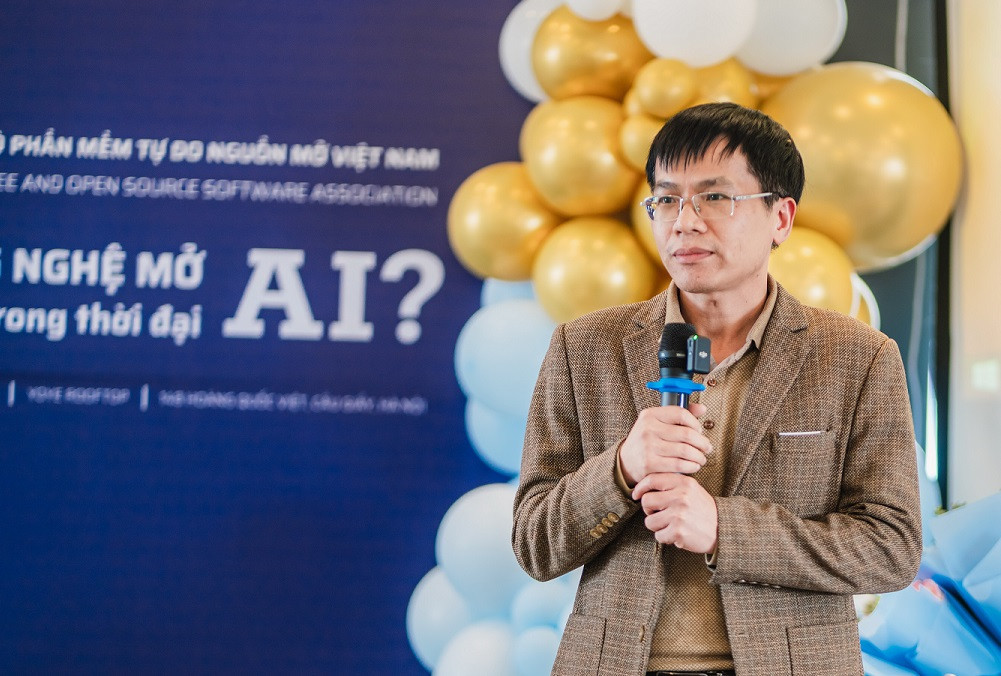
Vietnam Free & Open Source Software Association (VFOSSA) chair Ngo Hong Son talked to VietNamNet about the current situation and the willingness to develop open technology in Vietnam.
Why is open technology considered a groundbreaking choice in the AI era?
Statistics show that more than 100 countries prioritize using open source software in government agencies, and 69 percent of technologists in the public sector want to intensify the use of open source software.
To master technologies, it is necessary to have deep knowledge about the technologies, inherit and develop open platforms, and then declare the ‘opening’, so that the community can assess and further develop the platforms. This is an effective way to master technology. If a country buys closed technologies, or develops technologies from the very beginning, it will be very difficult to catch up with the world.
What has Vietnam done in using open technologies in AI projects?
Vietnam has been catching up with the open technology trend since the 2000s and has recently quickly “caught the AI trend”.
Vietnam has a great advantage in a highly qualified workforce with in-depth research capacity and the ability to access new technology. Many Vietnamese AI research groups have publicized high-quality scientific research works at the world's leading AI conferences.
Some large companies have invested in infrastructure to train AI models, which serves the development of products and provides services globally.
At which level is the Vietnamese business community in grasping opportunities from open technology?
Utilizing open technology and AI can bring great opportunities to businesses, both small and large. The problem is whether businesses can take full advantage of the opportunities to improve their business advantages.
Many large corporations in the world make heavy investment in open technologies, so they are more proactive in technology than Vietnamese enterprises. Chinese businesses, for instance, inject big money to open technology to master technology.
Vietnam also began interested in open technology very early, but the development is slow because of lack of sharing. Many tech firms after developing products from open technology closed down and they did not support the community to continue developing, thus reducing the strength of the open source community.
Does Vietnam have legal documents and policies mentioning the development of open technology?
VFOSSA has contributed ideas and persuaded policy makers to include open technology in legal documents. At the Vietnam Open Technology Forum 2020, Minister of Information and Communications Nguyen Manh Hung affirmed that open technology is the choice to master technology. The national strategy on AI research, development and application until 2030 also prioritizes open technology.
However, the community's recent interest in open technology is still as high as expected. The Politburo’s Resolution No57 dated December 22, 2024 on breakthroughs in science, technology, innovation and national digital transformation affirms the determination that "Vietnam must master technology". This should be understood that if we want to master technology, we need to choose solutions, and open technology is a priority.
What are your biggest wishes for policies related to open technology?
VFOSSA hopes that public investment projects or science and technology topics, funded by the state budget, will be developed based on open technology platforms to increase transparency.
Switzerland has required all public investment projects to publish source codes and use open technology to monitor transparency.
In 2024, VFOSSA advised the Vietsens Technology Group to open source code of the OpenHIS project, which is currently used in many facilities such as Bach Mai Hospital and Ha Nam General Hospital. This is a great effort to contribute to the open source community.
If more Vietnamese businesses also have open source software projects, especially in public services, it will benefit Vietnam in the long run.
What do you think about Vietnam's position in the region in terms of open technology development by 2030?
If Vietnam has specific priority policies, this will help promote the development of open technology, thereby improving the ability to master technology, promoting innovation and sustainable development.
Up to now, the number of Vietnamese open source projects reaching out to the world has been low.
I hope that by 2030, with the cooperation of the whole community and support policies from the government, Vietnam will have worthy open source projects, making positive contributions to the world community.
Trong Dat